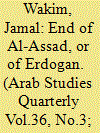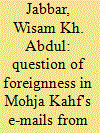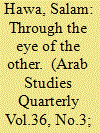|
|
|
Sort Order |
|
|
|
Items / Page
|
|
|
|
|
|
|
| Srl | Item |
| 1 |
ID:
134010


|
|
|
|
|
| Publication |
2014.
|
| Summary/Abstract |
In this article, I argue that Turkish Prime Minister Recep Tayyip Erdogan wanted to improve relations with Syria because he wanted Turkey to play a leading role in the Arab world. This role is promoted by the United States which aims at creating an alliance between Turkey and the Arab states to block Russia, China, and Iran from having access to the East Mediterranean or the Indian Ocean. Turkey's reward would be to have access to Arab markets and oil. Syrian President Bashar al-Assad was tempted by the United States, Turkey, and conservative Arab regimes to sever his ties with Iran, which he refused to do. Therefore, the former powers supported the Syrian uprising (which started as domestic protests against dictatorship, corruption, and misrule) to topple al-Assad. However, two and half years since the Syrian uprising started, the al-Assad regime seems to be resisting the attempts of his opponents to topple it, which would mean a failure of Erdogan in his political bet and might even lead to his downfall, especially after the eruption of protests against Erdogan throughout Turkey in early June 2013.
|
|
|
|
|
|
|
|
|
|
|
|
|
|
|
|
| 2 |
ID:
134013


|
|
|
|
|
| Publication |
2014.
|
| Summary/Abstract |
This paper examines foreignness in Mohja Kahf's poetry volume, E-mails from Scheherazad (2003), as a celebratory commodity rather than a literary trope to resist Arab women representations or to accentuate exilic voices. Drawing on Julie Kristeva's conceptualization of foreignness as internal personae and not a projection of an external locus of identity, this paper explores how the speakers in some of Kahf's poems view foreignness as festive rather than negative. In sharp contrast to the traditional conception of difference as publicly alienating, foreignness to the Arab-American speakers becomes a distinctive mark that they uphold and celebrate. Examining foreignness in Kahf's poems through Kristeva's lens provides a sense of uniqueness to the immigrant's experience. The notion of recognizing the foreigner in ourselves, that Kristeva provides, subverts the general perception of foreignness as external and intruding. Kahf's poetry can be perceived as a negotiation of foreignness, which is not an estranging element that incurs resistance but rather as a celebratory part of the human consciousness that should be jubilantly defined rather than politically defended.
|
|
|
|
|
|
|
|
|
|
|
|
|
|
|
|
| 3 |
ID:
134011


|
|
|
|
|
| Publication |
2014.
|
| Summary/Abstract |
This article seeks to apply Derrida's deconstruction of elements constituting national identity as established under colonial power to the study of Bassam Tibi, Fouad Ajami, and Bernard Lewis' work on Arab identity. This approach allows the emergence of colonial and neo-colonial elements underlying these authors' understanding of what Edward Said identified as the "Arab condition." Analyses show that both Arab authors' definition of Arab identity has been heavily influenced by colonial powers in a threefold manner: early colonization of the Arab lands by the Ottomans until 1920, European colonial rule during the nineteenth and twentieth centuries, and finally, the impact of living in the West. The article also highlights how the colonial power, exemplified in the work of Bernard Lewis, chooses to view the colonized "other" and often changes this view in accordance with political expediency.
|
|
|
|
|
|
|
|
|
|
|
|
|
|
|
|
|
|
|
|
|